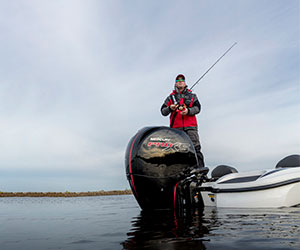
What's New?

Rain didn’t dampen the spirits of 14 Casting Couples contestants in the season finale at Magician Lake last weekend.

Man, you talk about a close finish! It doesn’t get much closer than what the Arjay’s Classic experienced at Paw Paw Lake on Saturday.

New Gear
The ClapTail™ 110 is a topwater bait with a metal prop and back blade that collide when retrieved, producing a unique two-tone fish-attracting sound.
Newsflash
Bassmaster Elites No Longer Pay to Play
- Details
BIRMINGHAM, Ala. — Professional bass fishing will never be the same. Ever. That’s a huge statement. In this case, it’s true. B.A.S.S. just announced that the Bassmaster Elite Series, heading into its 20th season, will no longer require entry fees. Yes, you heard that correctly. In 2025, competitors of the most prestigious tournament trail on the planet, for the first time ever in the history of B.A.S.S. competition, will no longer fish for their own money. No longer are Elite Series pros required to pay to play.
This historic decision was not made lightly. B.A.S.S. has long believed that the ultimate goal of the organization’s highest level of competition should be on par with other individual professional sports, like golf and tennis, which do not require pros to pay entry fees to compete. However, on the heels of record-breaking viewership of Bassmaster LIVE on FOX networks and Bassmaster.com, paired with strong long-term partnerships, this ultimate goal has been realized.
“We have been looking at this model for quite some time,” said B.A.S.S. CEO Chase Anderson. “But, we wanted to make sure that when we flip this switch, which we believe will change the face of professional bass fishing, that the concept is sustainable for the future. For the past several months, we’ve done our due diligence and came to the realization that, with the money we planned to allocate to payouts in 2025, we could offer attractive payouts without putting angler money at risk. This change greatly reduces the risk and financial strain required to compete at bass fishing’s highest level. Now, the Elite Series is in a league of its own, and the only league equivalent to other major individual sports.”
Another Viewpoint about FFS in Michiana
- Details
By Louie Stout
 Fizzing a bass
Fizzing a bass
We’ve all heard the pros and cons of forward facing sonar (FFS).
“Older anglers don’t want to adapt.”
“It’s not fishing. It’s video gaming.”
“It provides an unfair advantage.”
“It’s boring to watch online or on TV.”
“It’s perfectly legal and enables an angler to fish for fish that were previously unmolested.”
I see both sides, but frankly, there’s an underlying issue that is being overlooked, especially here in Michiana.
Big fish are dying of barotrauma because some anglers using FFS in deep water aren’t taking care of their catch.
Your responsibility does not end just because you got your fish to the weigh-in scales alive.
I don’t fish a lot of tournaments, but there have been released seen fish struggling along the bank at several events where FFS produced top catches.
Those struggling fish were brought to the surface quickly and their swim bladders filled with gasses. When this happens, the fish cannot swim naturally. The ballooned air bladder pushes against the heart and restricts the heart from pumping blood, hence the fish dies.
Of course, there is a solution – fizzing – a delicate practice that needs to be done the moment you see a fish floundering sideways in the livewell.
I fished a weeknight event with a 13-year-old neighbor boy. As I was backing the trailer at the end of the night, the boy was in the water trying to revive a 4 pounder, struggling to swim upright, that someone released off the dock. Another angler was attempting to fizz another 3 pounder – not his - in the darkness with a cellphone flashlight.
The 4 pounder, and likely others, died.
Scoping is a rapidly growing practice among tournament anglers. It’s perfectly legal, but when you multiply this incident times hundreds of other tournaments held in both states, one has to wonder how many bass are dying unnecessarily.
The point is that anglers who learned to utilize the technology have an added responsibility for taking care of their fish.
Especially on smallmouth bass lakes.
Smallmouth are highly susceptible because of their preference to roam, and a lot of giants are being caught from the middle of the lakes. Those fish, along with big largemouth, carry genetics that assure big, quality fish in the future.
Regardless of whether you scope or just fish deep, you need to learn the PROPER method of fizzing a fish that struggles to remain upright in the livewell.
And do it promptly.
Take time to watch this video. A northern BASS Nation Conservation Director, who has dealt with a lot of smallmouth tournaments, explains the truth about barotrauma and demonstrates the proper method for fizzing.
Page 12 of 267













Connect With Us